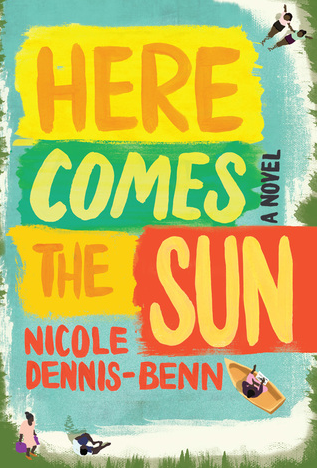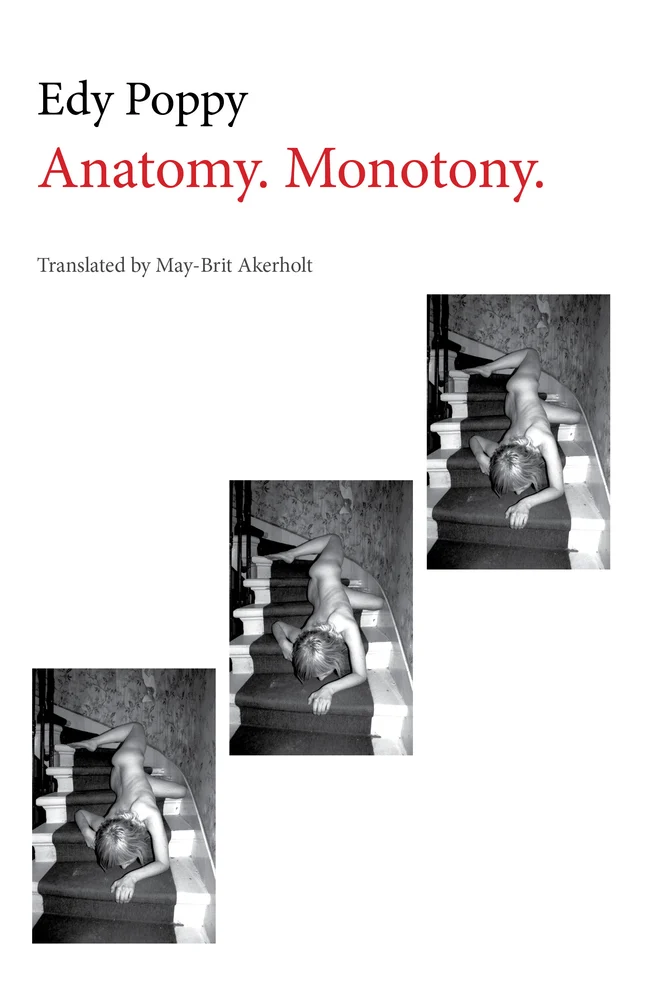Book by NICOLE DENNIS-BENN
Reviewed by

Nicole Dennis-Benn’s debut novel Here Comes the Sun opens with the stirring words, “God Nuh Like Ugly.” The melding of Jamaican Patois and English establishes an immediate authenticity, as does the disturbing discovery that ugly is synonymous with the blackness of one’s skin. The experience of reading this is akin to encountering Toni Morrison’s unflinching gaze upon the Antebellum South where she set her novel, Beloved. However, Dennis-Benn’s setting is not the slave-owning South of the 19th century U.S. but a black nation, the island of Jamaica, specifically, circa mid-1990s.
In sun-drenched, tropical River Bank, a former fishing village outside Montego Bay, overcome by daytime heat due to a drought, the novel’s multiple points of view mingle vibrantly and with purpose. There are four main characters: Margot, an ambitious, “nutmeg-brown” woman in her thirties who works diligently at the front desk of The Palm Star Resort and then offers up herself to the hotel’s clients after hours, “satisfy[ing] the curiosity of foreigners … who pay her good money to be their personal tour guide on the island of her body”; Delores, Margot’s mother, “a big black woman with bulging eyes and flared nostrils,” who sells various trinkets and souvenirs to tourists from her stall in a park; Thandi, Delores’ teenaged daughter, a bright and beautiful school girl, whom both Margot, her half-sister, and Delores view as their ticket out of destitute and sullied lives; and finally there is Verdene, Margot’s secret lover, who lives by herself in a pink house, “one of only two houses in River Bank built with real cement and blocks and a shingle roof,” and who is known to the community as “the Antichrist, the snake every mongoose should have hauled off the island and eaten alive; the witch who practices obscene things too ungodly to even think about.” Verdene is known to be a lesbian, and as a result, often the object of scorn in River Bank, a self-righteous, deeply homophobic place.
In her generous, unrushed prose, Dennis-Benn delves with laudable skill into both the past and present lives of these women. Two of them—namely, Margot and Delores—are writ large, their personalities indomitable, and all the characters’ stories, rife with daily struggles and indignities, hardly seem to fit into the novel. Sometimes, the reader is left with the feeling that one or more of the characters might have been sidelined a tad too long. For example, Verdene, after a falling out with Margot, seems to disappear for while. Nevertheless the delicious twists and intriguing turns keep the novel going. They are executed well, with plenty of conflicts between and within the characters, making the novel a satisfying page-turner.
The plot begins with Margot’s frank, easy monologue about her opportunistic liaisons with the foreign guests at the Palm Star Resort and her boss, a white Jamaican named Alphonso. She wears her exotic appeal like a glove and wields it like a pro. What keeps her in this shady business is her dream that Thandi, whom she’s helping put through school, will succeed and become a doctor, and she (Margot) can eventually get “away as far as possible…[m]aybe America. England, or someplace where she can reinvent herself … where she can indulge the desires she resisted for so long.” Margot keeps these unspeakable sexual desires under wraps from everyone, even from her mother, Delores, who also toils in the “rhaatid heat,” haggling with customers to make money for Thandi’s education.
The flaws in Margot and Delores’ dreams appear as soon as Thandi enters the picture. She is, after all, a very young girl with her own dreams, her own desires. When we meet Thandi, she is on her way to Mr. Levy’s Wholesale Shop to buy, among other things, the Queen of Pearl cream, a skin-lightening lotion from Mr. Chin, the Chinese owner of the store. It is worth noting here that in a novel so rich with complex, multidimensional characters, Mr. Chin feels like a stereotype with his ”squinting into the black faces that yell their orders” and “devouring of spoonfuls of steamed rice or noodles.”
Yet it is in Mr. Chin’s busy store that we discover the depth of Thandi’s desire to lighten her dark skin in order to “become less invisible and more beautiful, worthy of jobs as front desk clerks, bank tellers, models, head sales associates, and in some cases, flight attendants.” This unfortunate desire comes directly from the discriminatory notion—the lighter the better, the lighter the richer—that pervades Thandi’s world. For these women, skin color determines one’s fate, one’s potential for a better life, including escaping from the deplorable living conditions in one of the shacks of River Bank. Dennis-Benn’s writing makes even shacks lovely: they “look like interspersed cardboard boxes on the land surrounding the river,” not far from “a small fleet of fishermen’s boats” that have been “floating on the water like sleeping whales since last December before the drought.” And then this— “men marching up and down the shore with thick hard hats and heavy rubber boots, combing the sand with a sense of purpose as though searching for buried treasure.” The reader is left wondering what all this on-shore activity means—and we won’t know until much later. Here lies one of Dennis-Benn’s undeniable strengths as a writer—managing the balance between secrecy and revelation. She keeps the reader in relative darkness about some of a character’s motivations and past experiences, a few of them sexually degrading, gradually spinning out the truth in this complex tale of the conflict-ridden relationships between women and their bodies, between mother and daughters, between sisters in an unforgiving and downright cruel world.
It is Verdene, who bears the brunt of this cruelty. When she isn’t burying the bloody carcasses of fowls and stray dogs left by unknown perpetrators in her beautiful front yard, she sequesters herself in the house she inherited from her mother. Under the cloak of nighttime darkness, Margot visits Verdene after her shifts at the Palm Star Resort. Their relationship is initially fraught with sexual tension—Margot is uncertain and conflicted about her desires. But, once she submits to her desires for Verdene, she is unstoppable, and so the plot unfolds, driven by Margot’s ambitions and crafty machinations.
When Margot is passed up for a promotion at work, she confronts Alphonso, her lover and boss, and he appeases her by offering her a new job, the “boss lady” of a bevy of girls she will “recruit and train” for sex with the hotel’s wealthy (read: mostly white) clients. Margot accepts the job—and with this sinister turn of events, Dennis-Benn plunges the reader deeper into that uncomfortable space where class and race collide, sometimes with disturbing ease. For instance, the Jamaican girls whom Margot employs play their part well, kowtowing to the needs and desires of the foreigners who understand the power of their wealth.
As we enter the second section of the book, “Chicken Merry Hawk Deh Near,” a title that would easily find its place in a Marlon James novel, Dennis-Benn reminds us that each of her characters is in a bind created by the push and pull of societal forces. Quarrelsome Delores can’t move beyond her destitution because of her dark skin and lack of education, the latter indicated by her use of Patois over English. Book-smart Thandi is discouraged from aspiring to be an artist (“You is no damn artist. We too poor for that. You g’wan be a doctor. People can’t mek a living being no ch’upid artist”), or from pursing her budding love for Charles, who also lives in a shack. Despite her endless drive, Margot takes easily to conniving and to illicit work because it’s the only way she thinks she can achieve her goal. (In a heated argument between Delores and Margot, we discover that when she was underage, Margot was offered up for paid sex with one of Delores’ customers.) And then there is Verdene, who should have it easier, thanks to her lighter skin, relatively well-off parents, and her English education. But she is ostracized, even reviled in a society that views homosexuals as deviants, deserving of assault or death. Yet she can’t give up the house her deceased mother left her in River Bank out of a sentimental sense of duty.
By the time we get to the last section titled “Here Comes the Sun,” like the book, that “merry hawk,” namely, Alphonso and a group of private investors who aim to build a hotel, “bigger and grander than Palm Star Resort,” on River Bank, is indeed near. (Now we know what those men in hard hats were doing along the shore.) The residents of the land will be forced out and left homeless, unless they fight. Only Margot, thanks to her promotion, is in on the plans for the new hotel. She eventually severs her relationships with Delores and Verdene and loses any control over Thandi, whose love for Charles deepens. Margot envisions herself living freely and lavishly in a villa “made of glass.” Is there any doubt she’ll get what she wants? No, Dennis-Benn leaves us no room for doubt in her characterization of this forceful character. The other characters must settle for less desirable fates, bringing us full circle to the implacable reality that wealth and skin color define their world, and invariably ours too.
With this bold, new book, Dennis-Benn, a Jamaican who lives in New York and is a recipient of prestigious fellowships and prizes, stakes her rightful claim on the literary scene. She has written an interesting novel that concerns itself with issues we all, in some way or the other, must grapple with today. Although the novel’s execution buckles a little under the weight of ambition—the four main point of views and characters, and the multiplicity and complexity of revolving worlds—Dennis-Benn’s prose, which beams like the sun’s ray through the thickness of an ever-darkening plot, remains a true pleasure until the very end.
Angela Ajayi’s essays and author interviews have been published in the Star Tribune,Wild River Review, and Afroeuropa.




